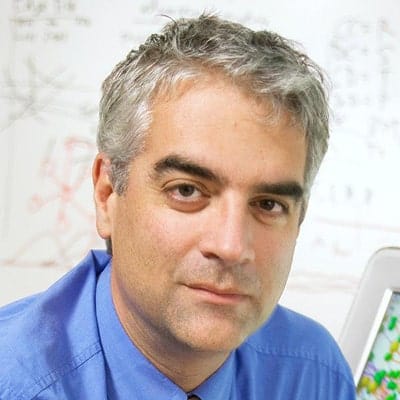NOMIS Center for Immunobiology and Microbial Pathogenesis Director Susan Kaech and NOMIS researchers Nicholas Christakis and Joanna Wysocka have been elected to the US National Academy of Sciences. They are among 120 new members and 24 international members to be elected to the academy in recognition of their distinguished and continuing achievements in original research. The election is considered one of the highest honors accorded to a scientist in the United States.
Susan Kaech
Susan Kaech (pictured above, center) is director of the NOMIS Center for Immunobiology and Microbial Pathogenesis and holder of the NOMIS Chair at the Salk Institute. Her discoveries have contributed significantly to the modern understanding of long-term immunity and how memory T cells form. Memory T cells are critical for maintaining long-term immunity during acute and chronic infections, and can also be suppressed in cancer. Kaech identified several genes and signaling molecules that are critical for memory T cell generation during immune responses. She also helped establish the field of cancer immunometabolism through her characterization of the metabolic interplay between tumors and immune cells, and how changes in nutrient availability can lead to metabolic immune suppression in tumors.
Kaech’s lab recently found that T cells listen to neurotransmitters released by neighboring neurons in tissues, regulating their anti-viral and anti-tumor functions. Working with Gerald Shadel and team at Salk, Kaech’s lab recently discovered that rewiring the flow of electrons in tumor mitochondria can enhance the immune system’s ability to recognize and fight cancer.
Nicholas Christakis
Nicholas Christakis (pictured above, left) is Sterling Professor of Social and Natural Science in the Faculty of Arts and Sciences at Yale University, and is a leading expert in the study of social networks and biosocial science. His research focuses mainly on the social, mathematical, and biological rules governing how social networks form and the biological implications of how they operate to influence thoughts, behaviors and feelings. During the COVID-19 pandemic, he conducted pioneering research on the connection between social networks and contagion. Christakis is director of the Human Nature Lab at Yale and the author of four books and more than 200 articles. He led the project Using Social AI to Modify Collective Behavior in Realistic Networks and is currently leading the Microbiome Biology and Social Networks in the Developing World.
Joanna Wysocka
Joanna Wysocka (pictured above, right) is the Lorry Lokey Professor at Stanford Medicine and professor of chemical and systems biology and of developmental biology. Wysocka’s research is focused on understanding gene regulatory mechanisms in human development, disease and evolution. She is broadly recognized for her work on gene regulatory mechanisms underlying stem cell function, cellular plasticity and differentiation. Some of her group’s most notable contributions include the discovery of chromatin signatures associated with active and primed enhancer elements, development of new tools to visualize and study regulatory regions in living cells, and insights into the mechanisms by which changes in gene expression drive evolution, individual variation and disease of the human face. She pioneered the use of pluripotent stem cell models to study cis-regulatory evolution in hominoids and to probe how dosage deficiencies in transcriptional and chromatin regulators lead to cell-type specific manifestations in human congenital disorders. Wysocka is leading the project Individuality and Diversity of the Human Facial Form.
About the National Academy of Sciences
The National Academy of Sciences is a private, nonprofit institution that was established under a congressional charter signed by President Abraham Lincoln in 1863. It recognizes achievement in science by election to membership, and—with the National Academy of Engineering and the National Academy of Medicine—provides science, engineering, and health policy advice to the federal government and other organizations.
Read the Salk release
Read the Yale release
Read the Stanford release





